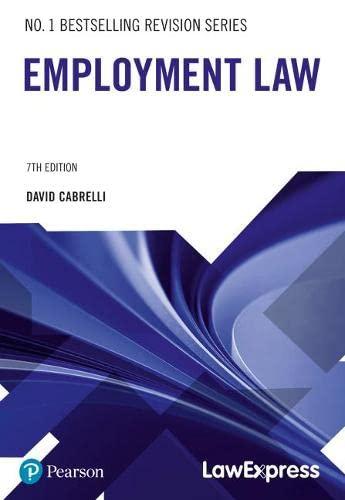Question
Who makes the stronger case - Turner or Lobel? Why? Teacher's thoughts/ add on The group has already got this question going... I will only
Who makes the stronger case - Turner or Lobel? Why?
Teacher's thoughts/ add on
The group has already got this question going... I will only post what I posted here to add some meat for your possibility to discuss this dispute between Lobel and Turner. Let me add some of my thoughts that are at play underneath the Lobel and Turner debate. The American Framers understood our political system to be a union of states and feared not only large states overpowering the smaller states, but feared the government of the new national union would suppress and act despotically over the states. But the Lobel and Turner debate is not a debate about the state vs National power but a debate about the differing powers of the national government--which masks that other debate because we forget that before the 20th Century (and the 17th Amendment) the Senators were not directly elected by the people but rather elected by the state legislatures and thus a level that the state and their gov't could exercise a voice over the Federal government. The contention between Turner and Lobel has been with America since the decade of the Founding that Hamilton and Madison publicly in The Pacificus-Helvidius Debates of 1793-1794. Hamilton and Madison's debate on who has more authority under the Constitution in these matters informs all these later debates about the role of Congress vs the Role of the Presidency, where over certain disputes the consensus on what the Constitution argues gives sway to the President and other times it gives power and authority to the Congress against the President. This debate between Turner and Lobel (on the Constitutionality of Executive powers in War vs Congress's power) isn't new.. it is a long-time debate that has been waging since The Pacificus-Helvidius Debates of 1793-1794 between Hamilton and Madison. As this question is not so simple as the Constitution leaves this very much open to debate as we see two of the Principle authors of the Federalists openly at odds on this question. Also, I find myself that much of a fan of Turner and would have preferred we as a class would have rather something from someone like John Yoo and his The Powers of War and Peace: The Constitution and Foreign Affairs after 9/11. University of Chicago Press. 2005. And in his Crisis and Command: A History of Executive Power from George Washington to George W. Bush. Kaplan Publishing. 2010 Yoo makes a much stronger case for executive power under Constitutional law than what we get here. Also for a very powerful justification of executive power and its need I would point to the work of Eric A. Posner and Adrian Vermeule in their The Executive Unbound University Chicago Press. 2013. Although Posner and Vermeule point to a limitation of the Constitution on necessary powers required in the modern world of the 21st century and as such I find Yoo--much more grounded in the Framework of US Constitutional debate than they. Also, I find Turner not the best advocate of this position for Executive authority. Let me point you to some writings by John Yoo, who is a Constitutional Law scholar with expertise in this area who would agree with your pro-Executive power position, which also was the position taken by Hamilton both in The Federalist Papers and in Pacificus. Here are some items by John Yoo: John Yoo. The Powers of War and Peace: The Constitution and Foreign Affairs after 9/11. University of Chicago Press. 2005. John Yoo. Crisis and Command: A History of Executive Power from George Washington to George W. Bush. Kaplan Publishing. 2010 John Yoo. "Declare War" in The Heritage Guide to the Constitution. https://www.heritage.org/constitution/#!/articles/1/essays/49/declare-war
PermalinkShow parentReply
References:
- Lobel, Jules; Turner, Robert F. Covert War and the Constitution/Covert War and the Constitution: A Response, Journal of National Security Law and Policy, Vol. 5 (2011-12), pp. 393-408 and 409-428
- Lobel, Jules; Turner, Robert F. The Constitutionality of Covert War: Rebuttals. Journal of National Security Law & Policy; 2012, Vol. 5 Issue 2, p 429. July 2012
Step by Step Solution
There are 3 Steps involved in it
Step: 1

Get Instant Access to Expert-Tailored Solutions
See step-by-step solutions with expert insights and AI powered tools for academic success
Step: 2

Step: 3

Ace Your Homework with AI
Get the answers you need in no time with our AI-driven, step-by-step assistance
Get Started


